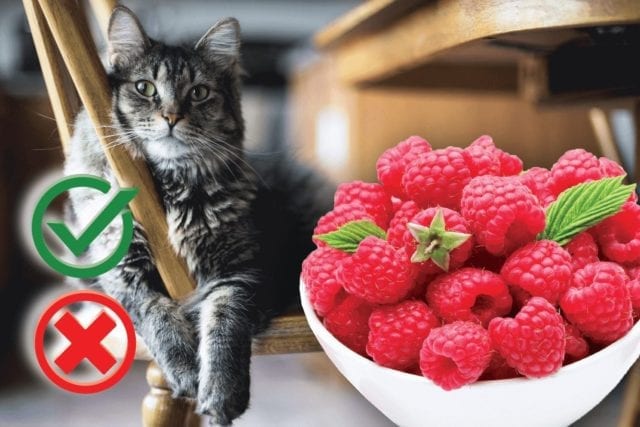Yes, but…
To preserve the health of your cat and especially to allow it to live as long as possible, it is important to monitor its diet. It’s possible for cats to eat certain berries, including raspberries. Discover the effects of raspberries on the well-being of your companion.
Can cats eat raspberries?
The bottom line is that it’s okay for cats to eat raspberries. It is not on the list of plants that are toxic to cats. However, when giving it, you should give it in small amounts and not often.
We don’t know if cats are interested in raspberries, but it seems that many cats are more interested in frozen raspberries than raw ones. It’s more like looking at raspberries as a little toy, rather than showing interest in it as food. On hot summer days, it might be a good idea to give frozen raspberries as a little snack.
The benefits of raspberries for your cat
Cats are carnivorous animals. Therefore, they must be fed with croquettes or pates specially designed for them. Although fiber is a bit toxic to cats, you can supplement your pet’s diet with raspberries. Unlike dogs, the cat’s stomach is quite capable of digesting this fruit.
Composed of vitamins C, A, and K, potassium, magnesium, manganese, calcium, and dietary fiber, raspberries are beneficial for the health of your cat. It makes it possible in particular to enrich the diet of the latter and to facilitate digestion.
Raspberries also help ward off chronic diseases and strengthen your pet’s cardiovascular system.
How much raspberries should you give your cat?
Even if a cat’s stomach tolerates raspberries, care should be taken not to give it more than it needs. Therefore, it is advisable to give them a maximum of one to two berries per serving. In addition, these portions should not be given to the animal every day. Two servings per week are more than enough.
In the event that the cat consumes excess raspberries, this can have a number of side effects. These side effects include gastrointestinal distress, dehydration, and kidney problems. Your cat may emit smelly feces or simply vomit. It is precisely this vomiting that will lead to dehydration. Eventually, Its kidneys will be affected.
What if your pet has eaten too many raspberries?
Raspberries taken in trace amounts are not toxic to your pet. Therefore, you should not have to worry if the required quantities are met. In the event that It has eaten a little too many raspberries, it would be ideal to consult a veterinarian as soon as possible before the situation worsens.
A specialist will be able to tell you what to do to recover your animal as quickly as possible. However, if you do not want to take any risks, it is possible to replace the raspberry or all the fruits and vegetables that are beneficial for your cat and just give It vegetarian croquettes.
They can provide your cat with almost all of the plant nutrients found in raspberries. However, before opting for this solution, it is important to talk to your veterinarian first. This, in view of the physical health of your animal, will be able to determine whether it is possible to incorporate such kibble in his diet without this harming his health.
Ultimately, it is possible to give your cat raspberries to eat as long as you respect the recommended amounts. In case of doubts or complications, only the opinion of a veterinarian prevails.
Final Thoughts
Raspberries can basically be given to cats. However, give it infrequently and give it in small amounts. Also, when giving for the first time, please observe the situation closely and check if there is any change in your cat’s physical condition. Since there are individual differences depending on the cat, some cats may get sick .so please take a close look and consult your vet in case of any emergency.


